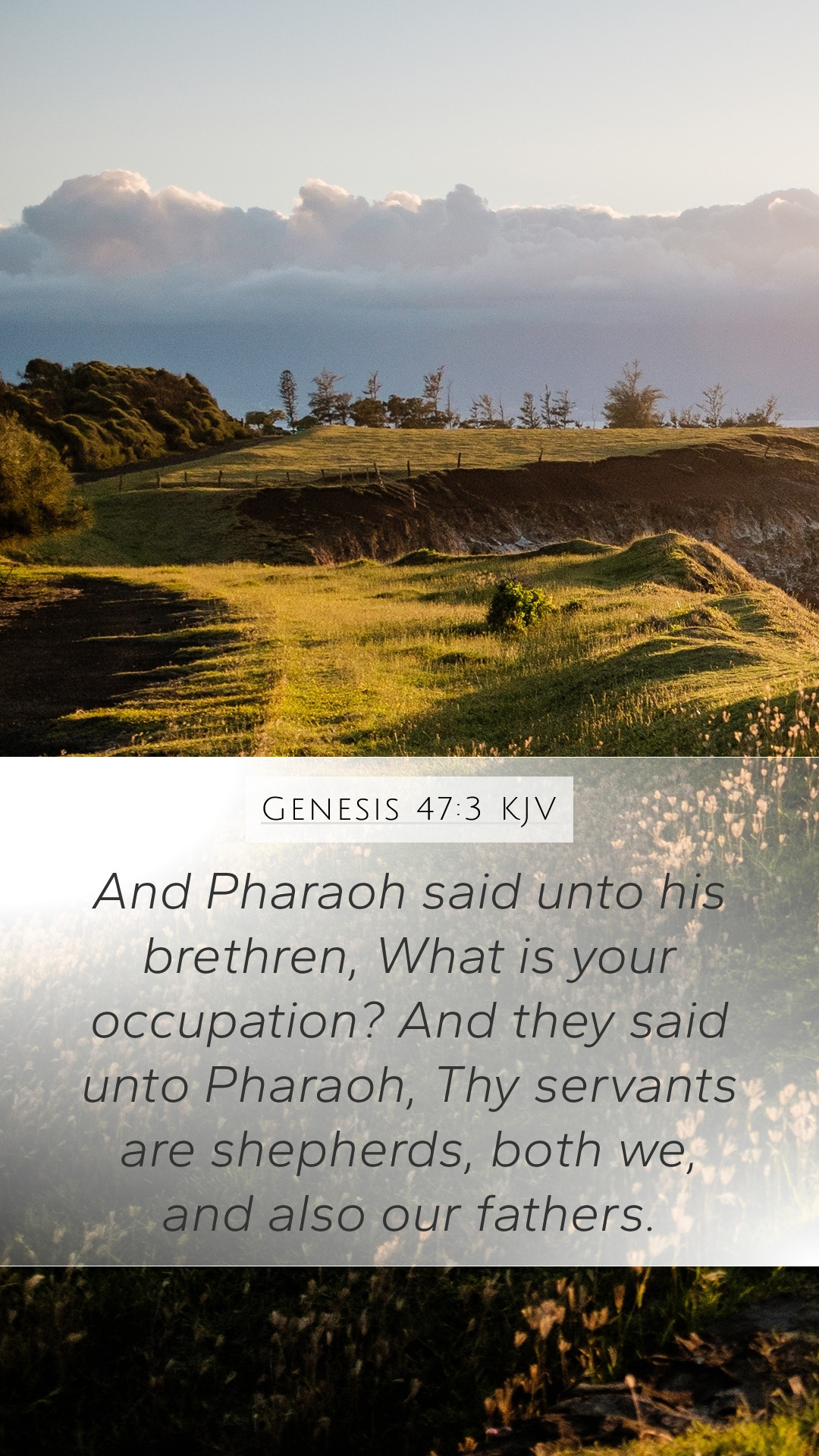Understanding Genesis 47:3: A Comprehensive Bible Verse Commentary
Genesis 47:3 reads:
"And Pharaoh said unto his brethren, What is your occupation? And they said unto Pharaoh, Thy servants are shepherds, both we, and also our fathers."
This verse is part of the larger narrative concerning Joseph and his family’s arrival in Egypt during a time of famine. The verse captures a moment of interaction between Pharaoh and Joseph’s relatives, which is significant for its cultural and relational context.
Contextual Background
In order to fully grasp the meaning of this verse, it is essential to consider both the immediate and historical context:
-
Historical Context:
The setting is during Joseph's governance in Egypt when he has become second in command under Pharaoh. His family comes from Canaan seeking sustenance amidst the famine that has ravaged their land.
-
Cultural Context:
The Egyptians regarded shepherds as an abomination (Genesis 46:34). Thus, Joseph’s family’s profession might elicit an interesting response from Pharaoh, which is a point of significance in this interaction.
Insights from Public Domain Commentaries
Matthew Henry's Commentary
Matthew Henry emphasizes the providential nature of this encounter. The servant leaders of Egypt recognize the need for wisdom from Joseph’s family, demonstrating how God’s plans often intersect with human affairs. Through this interaction, we see not only God’s provision but also His guidance in shaping the lives of those who are faithful.
Albert Barnes' Commentary
Barnes highlights the question posed by Pharaoh, noting the significance of understanding one's identity and purpose. The response from Joseph’s brothers illustrates their humble acknowledgment of their occupation, providing insight into their character and the importance of humility before authority.
Adam Clarke's Commentary
Adam Clarke points out the cultural implications of the response given by Joseph's family. Their profession as shepherds would have made them distinct within Egyptian society, indicating how they are both foreign and set apart. Clarke notes that their honesty in admitting their occupation sets a tone of integrity and sincerity, characteristics that are vital in any faithful servant of God.
Meaning of Genesis 47:3
This verse serves multiple purposes in its interpretation:
-
Identity and Purpose:
The interaction demonstrates a recognition of identity—acknowledging who they are in relation to Pharaoh and Egypt. It suggests that understanding one's purpose and being open about it can create space for relational growth.
-
Humility:
The humble acknowledgment of being shepherds speaks volumes about their character. It is a reminder of the importance of humility when addressing power and authority.
-
Cultural Sensitivity:
Recognizing the division between Egyptian and Canaanite cultures prepares the ground for the narrative that follows, wherein Israel’s distinctiveness is both honored and tested.
Bible Study Insights
For those engaged in bible study—whether in bible study groups, online bible study, or personal reflection—the examination of Genesis 47:3 can yield rich insights:
- How does one’s occupation reflect their identity in Christ?
- What does humility look like in your daily interactions with authority figures?
- In what ways can understanding cultural contexts enhance our interpretation of scripture?
Application of Genesis 47:3
Applying the lessons from Genesis 47:3 requires looking at practical implications:
- Understanding and accepting your identity in Christ can empower you to engage effectively in society.
- Practice humility in all areas of life, particularly in professional and relational contexts.
- Being aware of cultural nuances allows for better communication and connection with others in diverse settings.
Related Cross References
Several Bible verses provide additional depth to the themes presented in Genesis 47:3:
- Genesis 46:34: Provides background on the Egyptians' disdain for shepherds.
- Psalm 78:70-72: Discusses God choosing David, a shepherd, to lead His people.
- 1 Peter 5:2: Encourages spiritual leaders to tend to their flock with humility.
Conclusion
The examination of Genesis 47:3 offers profound bible verse explanations, encapsulating themes of identity, humility, and cultural engagement. Through the insights from timeless commentaries, believers can glean valuable lessons applicable to their lives today.
For further exploration of bible verse meanings and to deepen your understanding of Scripture, consider engaging with various bible study resources, guides, and lessons that reflect on similar themes throughout the Bible.


